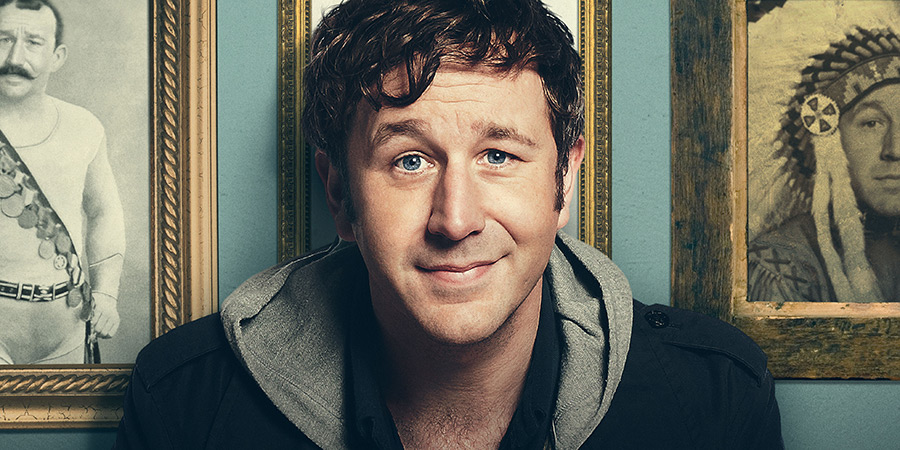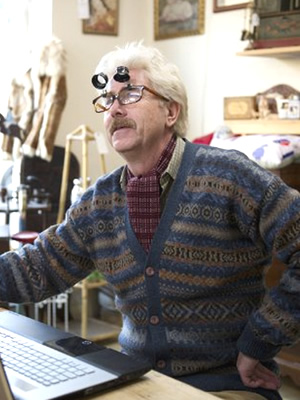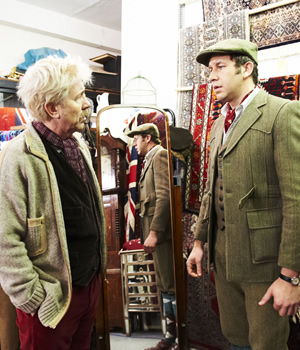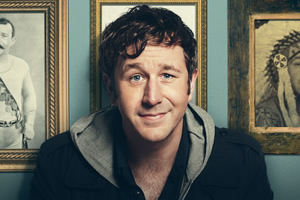Jim Piddock interview


Jim Piddock co-wrote Family Tree with Christopher Guest and appears in the show as Mr Pfister too...
Hi Jim. How did the idea of Family Tree come about?
Chris Guest called me and said "I've got this idea let's have lunch". We'd never written together before although we had worked together several times on different things. Chris had been personally doing some study of his family history and wondered if there was a story in genealogy.
We continued talking and one of the key points was whether it should be a movie or series. It felt like the latter because of all the potential branches that can go anywhere and I liked that idea more. I Iike not being bound by a structure of setting something up, rolling it along, and having a conclusion or build up to the finale. It felt like it was a series so we started to think about that and how it would work and that was new territory for Chris.
Initially we thought we would start the programme in America and see where it took us but I'd watched Bridesmaids and saw this actor who apparently was pretty well known in England and he blew me away in that film. For me, he was actually the heart and soul of the movie. Then I saw Chris O'Dowd on a talk show and he was hilarious, just really natural. We knew we were looking for someone who was funny, could be a leading man, and who had that ability to be very real as well... and they are rare, very rare.
Tell us about the character of Mr. Pfister. His relationship with Tom is both funny and touching.
In terms of our relationship I become a bit of a father figure and Tom becomes the son I never had - I have three daughters, so I think that is where Tom is able to talk about stuff he can't talk about with anyone else. My character is a lot smarter than Tom's dad or his friend Pete - well that table over there is smarter than Pete - Tom is clearly a bright guy so I think I become someone that he can talk to about the bigger things in his life. We often find people that become surrogate family members and it's about that too ultimately. What is family? Is it your blood relations or made up of other people?
Tom's search for his personal identity and his place in the world becomes the tool we use for the eternal or mythical search for where we fit in the world and that's what this is really about. Questions of who am I? Where do I fit in the world? Where do I fit in the chain of history? What does family mean? There's an old Indian saying, "Everyone has a hole in their soul that needs to be filled" and to a degree this is a comic take on that.
Do you enjoy being in something you have written?
I have immense admiration for the writer/directors and director/actors who just seamlessly do both jobs at the same time. This is the first time I have done it on such a scale and I had to take some time out before I filmed my scenes because my head was completely in a writer's place and I was having to be a grown up. I don't mind being a grown up but I also needed to be a kid again, to play in the scenes I was doing and luckily they were compacted all into a couple of days. But yeah that was a transition.
What was the writing process with Christopher like?
It took Chris and me eight months to write the outlines to Family Tree, which were layered and very detailed. Chris's work particularly has always been known for its detail, which is painstaking at times. I usually just dive straight in but Chris said be prepared to work at a glacial pace and in the beginning it was pre-glacial.
We would spend hours together, literally six or seven hours sitting round a table with a bowl of nuts and some fruit making each other laugh. I would get home at the end of the day and my girlfriend would ask how we got on and we may have had one line or one joke that we could use or one idea, but we had fun and it was like that for a quite a while before it gradually started to take shape.
Do you agree that improvisation is a specialised skill?
I'm always a bit loathed to say you've either got it or you haven't because I think actors can learn skills or have off days. We saw some terrific actors where this kind of work is just not their thing - it's not what they do. Then we saw other people who are not particularly good structured actors who were fantastic and are very natural, so whilst it is a specific skill and a specific type of work not everyone can do it though that doesn't mean you are good or bad.

What outlines have you and Chris written as a starting point for your cast?
Chris and I wrote detailed episode outlines and character breakdowns that included each character's history right back to where they went to primary school, high school, college and what they studied. So we all had a lot of material to work with.
From a story point of view there is much more history than we usually work with in Christopher's films and I think that's because we felt there was a detective element to genealogy. In a way we were writing a comedy procedural and you can't fudge that. What we do is we use the genealogy as a backbone, an excuse to go into different worlds, which is what Chris loves to do in the movies. For example we go into the world of 1930's theatre and musicals, then we go to the country and in America we go into the world of re-enactments and cowboys.
Does working in this style feel as carefree as a play?
I remember my first day on A Mighty Wind, which was the second film I did with Chris. It was also Catherine O'Hara and Eugene Levy's first days and we had a dinner scene to film. I was a bit nervous, but they were more terrified than I was which made me feel better. It's always great seeing other people suffering more than you.
Similarly, actors came in for the first time this time and said they were really nervous and my response was 'I'm terrified and I co-wrote this, so join the club!' It doesn't make them feel any better but join the club. And it really is terrifying on many levels. However, once you get through that, it's exhilarating because you've walked that tightrope without the net and it's exciting for an actor.
Chris Guest has become a unique voice in cinema. What do you think makes his films stand out among other film-makers?
I think Chris is very detail oriented and loves spontaneity. He doesn't like the traditional forms of comedy and I think that what he's found is a way to channel the type of comedy he likes before anybody else. There was a huge amount of detail and work that went into this from every prop and photograph to costumes and pantomime horses. There were hours and hours and hours of thought just for a joke that we may have thought of months before.
The first week or so we said let's see how we get on and how it works. It was just great because we're not joke writers per se, but we like esoteric, smart stuff and really stupid, rude stuff and not much in between. My influences are Monty Python, Peter Cook & Dudley Moore. I probably have more tolerance for broadness and vulgarity in public than Christopher but when it's just the two of us in a room he can probably outdo me on all those, though he'll never admit that. It's really interesting to work with someone who is bright too and interested in history as we both are and trying to delve into areas that haven't been done before.
Family Tree aims to be a very funny comedy but also a show with a lot of heart. What themes do you explore throughout the series?
The audience has to be emotionally connected to these people and that was something we worked very hard on from the beginning. The trick is to make the audience care and why should they care about someone else's family history? Even genealogists we met said listening to other people's family history is the most boring thing in the world. So the hardest part was creating a hook to people and making audiences laugh out loud one minute and find it emotionally moving the next. I don't find it easy to get that balance so we worked really hard to make sure that we cared enough and that audiences would care too.
And the same with Nina, when she was with the monkey and she was talking and you just saw the pain. The monkey was speaking her pain and she was just perfectly cheerful, and the traumas that caused her to have the monkey as a grown woman and it was very moving, and I thought great, that's it. And if we can keep that balance I think that's what people will come back to.
When you saw the show come together, did you see the kind of magic you wanted happening?
What is so thrilling is that every single actor has struck that magic note. It's really bizarre working with the best people. What is extraordinary with this show is that each actor has that duality where you see the pain and emotion behind the humour and that's really exciting when you have it so consistently.

